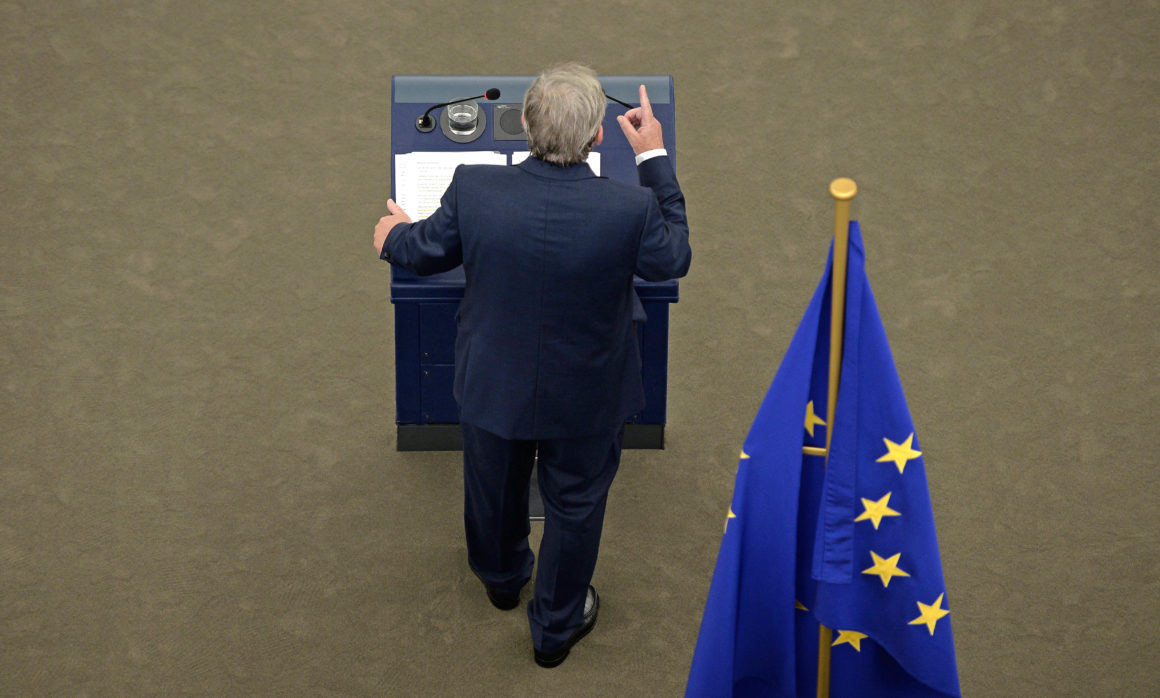Wednesday, September 13

UNITED WE STAND
European Commission president delivers annual address

Jean-Claude Juncker will deliver his State of the European Union address today to the European Parliament in Strasbourg, France.
As anti-EU parties have been slow to gain ground, Juncker’s address will be far more optimistic than last year’s edition. A free trade deal recently agreed with Japan will add further cheer to the occasion. Juncker’s address will also cap off a dramatic reversal of fortune for the EU, although Brexit and illegal migration remain significant challenges for the bloc.
With European parliamentary elections set for 2019, this year’s address represents a final opportunity for Juncker, who is not seeking another term, to lay the groundwork for what he wants to achieve as European Commission president. As such, Juncker has declared this year’s address as “more important than the 2018 one”.
Expect Juncker to use his annual address to fast-track trade deals with Australia and New Zealand. Policy details for a coordinated framework for screening foreign investment will also be on the agenda, as Juncker targets greater economic coordination within the trade bloc.
MOON AND A NUCLEAR SUN
South Korean opposition requests US nuclear deployment

Today a delegation of officials from South Korea’s conservative opposition, the Liberty Korea Party, arrives in Washington to discuss the possible redeployment of American nuclear weapons on South Korean soil.
Although forward deploying short-range quick-response nuclear weapons would have little tactical value, the proposal has been attracting interest since Korean Defence Minister Song Young-moo revealed that he had discussed the idea with Secretary of Defence James Mattis last week. Although Seoul quickly denied they were pursuing such a policy, the South Korean opposition moved forward to include such proposals in the 2018 budget.
The nuclear debate exemplifies the fault lines in South Korean politics, where the relatively dovish administration of Moon Jae-in battles hardliners in both the parliamentary opposition and the White House who advocate for a harder line against North Korea.
Moon has already appeared to bend somewhat to hawkish pressure; last week both South Korea and Japan agreed to buy billions of dollars of advanced weapons technology from the United States.
Delve deeper: Flashpoints and fraternity: the US-South Korea alliance
SPORTING SCEPTICAL
2024 and 2028 Olympics to be officially awarded to Paris and LA

The International Olympic Committee (IOC) will gather in Lima, Peru today to officially announce Paris and Los Angeles as the respective hosts of the 2024 and 2028 Summer Olympics. The announcement follows the IOC’s landmark July decision to award both Summer Olympics simultaneously.
Remarkably, Paris and LA have been unopposed for hosting rights, following the withdrawals of Boston, Budapest, Hamburg and Rome.
The withdrawals were symbolic of the huge costs involved in hosting the games. Rome’s Olympic committee faced considerable public opposition, leading to Mayor Virginia Raggi deeming the bid “irresponsible”. The 2016 Olympics cost Brazil an estimated $20 billion, while the preceding event in London was three times over budget, costing $14.9 billion.
With interest in hosting the 2032 Olympics lukewarm, IOC President Thomas Bach will be hoping Paris and LA can restore prestige to the event. Their respective budgets of $3.96 billion and $5.3 billion, however, are unlikely to even remotely cover the cost of the gargantuan sporting spectacle.
HAPPENING ELSEWHERE…
The Rohingya, Lebanese PM in Moscow, 100 days of the Qatar spat

The UN Security Council will meet behind closed doors on the “deteriorating situation” in northern Myanmar, where more than 300,000 Rohingya Muslims have fled to Bangladesh since August 25. On Monday, the UN’s human rights chief labelled the military-backed crackdown on the minority “a textbook example of ethnic cleansing”. Meanwhile, the US has called on Myanmar to halt the violence; China—which has a history of supporting the country’s military junta—is believed to be resisting UN action. While today’s meeting will be private, a public declaration will be made and is expected to once more call on Myanmar’s government to halt the violence.
Lebanon’s Prime Minister Saad Hariri will meet Russian counterpart Dmitry Medvedev and President Putin in Moscow. Mr Hariri—the second most powerful man in Lebanon—will be looking for assurances that his country will be protected from any repercussions of a peace deal for the conflict in neighbouring Syria. Arms for the Lebanese army, demarcating and fortifying the border with Syria and ensuring Syrian refugees return to the country post-peace are expected to top the agenda. Meanwhile, the next round of Astana peace talks will begin tomorrow.
It’s been 100 days since a Saudi-led quartet of Arab states cut ties with Qatar. Hopes of a thaw were dashed on Friday after a phone call between Qatar’s emir and Saudi Crown Prince Mohammad bin Salman ended with Riyadh suspending talks with its neighbour. The current blockade on the small Gulf emirate is likely to extend well into next year, making it difficult for Qatari firms to do business in the region and pushing Doha to strengthen ties with Turkey and Iran. Plans for a more economically and politically unified Gulf Cooperation Council may be permanently damaged.
Lawmakers from New York state will arrive in Russia in a bid to foster closer business and tourism ties. The visit comes as diplomatic relations between the US and Moscow hit their lowest point since the end of the Cold War over allegations Russia hacked last year’s presidential election. The delegations are expected to explicitly avoid issues of national and international significance.


